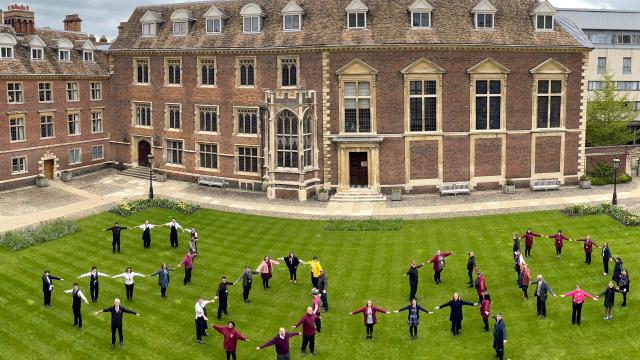
An alumna of St Catharine’s who returned for a PhD in Biological Sciences has blogged and appeared in a new video about participating in a public dialogue project on human embryo research. This comes at a time when the Human Fertilisation and Embryology Authority, the UK regulator of human embryo research, is making proposals to modernise the law in this area.
Amy Wilkinson (2017, Natural Sciences) is currently researching early human embryo development for her PhD. Over the past 30 years, human embryo research has led to the improvement of fertility treatments and enhanced our understanding of developmental disorders, amongst other breakthroughs. In the UK, the culturing of human embryos for scientific research has been restricted to a maximum of 14 days since 1990, informed by societal discussions. Now, recent innovations have led many scientists to believe it possible to culture human embryos in a laboratory beyond 14 days, providing the potential to learn more about a critical stage of development that we currently know very little about.
The public dialogue project came about after the Human Developmental Biology Initiative (HDBI) recognised the need to better understand society’s current hopes and concerns for embryo research to ensure that research continues to be carried out responsibly, transparently and with societal consent. Together with the UK Research and Innovation’s Sciencewise programme, the HDBI funded a mix of online and in-person workshops to explore the views of the UK public on these issues, with a primary focus on the 14-day rule.
Amy, who is based at Cambridge’s Babraham Institute and also part of the College’s active community of Harding Distinguished Postgraduate Scholars, explains:
“Now is a pivotal time in the field with rapid advancements in technology leading to a review into the way this research is regulated in the UK. I believe that it’s important that consultations around this are done in a meaningful way so that the scientific community can continue to make rapid progress informed by society’s expectations of ethical research.
“Seventy members of the public representative of the UK population took part in over 15 hours of activities to allow them to explore their own views on embryo research. This is different from other forms of public engagement because it goes beyond just informing people about the science; it also aims to get back the public’s perspectives on the science.”
Given the relevance to her work, Amy volunteered to support the project and was on hand during the workshops to answer any questions that members of the public might have, alongside other scientists, regulators, and ethicists.
“Before going in to the first workshop, I was a little apprehensive and unsure of what to expect. I was very worried about saying the “wrong” thing because this is such a sensitive topic. While this was in the back of my mind all the way through, seeing how interested the participants were to hear what we had to say, as well as the deep respect they had for every single person’s views, gave me more confidence.
“Actually, the biggest part of my role in the dialogue was simply to listen to the participants’ discussions. I say simply, but really this was one of the key aspects of this being a dialogue. It wasn’t about lecturing the participants; it was about having a two-way conversation. The discussions were honest and open, allowing everyone to voice their opinions from across the spectrum, and explore different misconceptions and myths alongside the excitement for the future of the field.”






